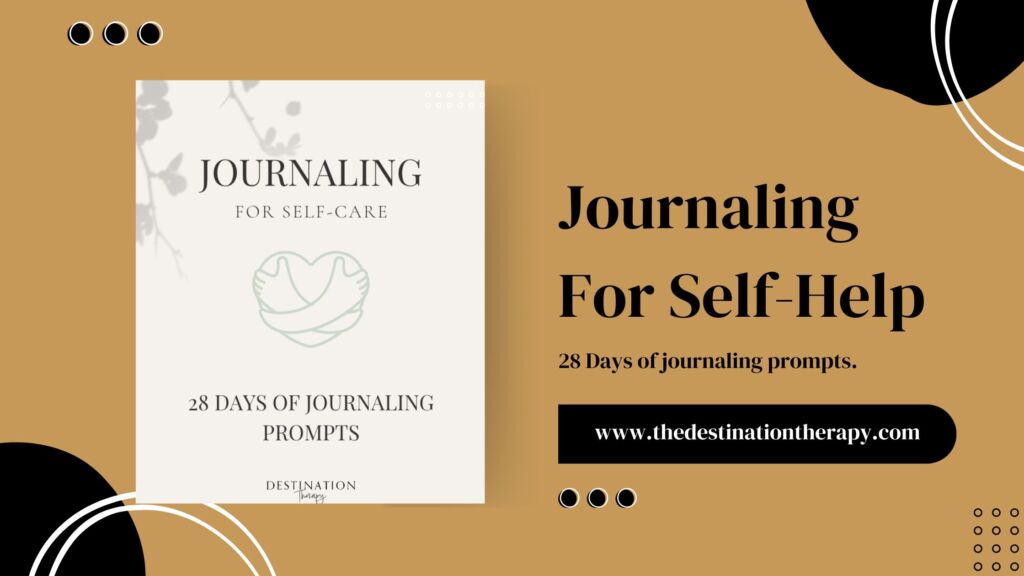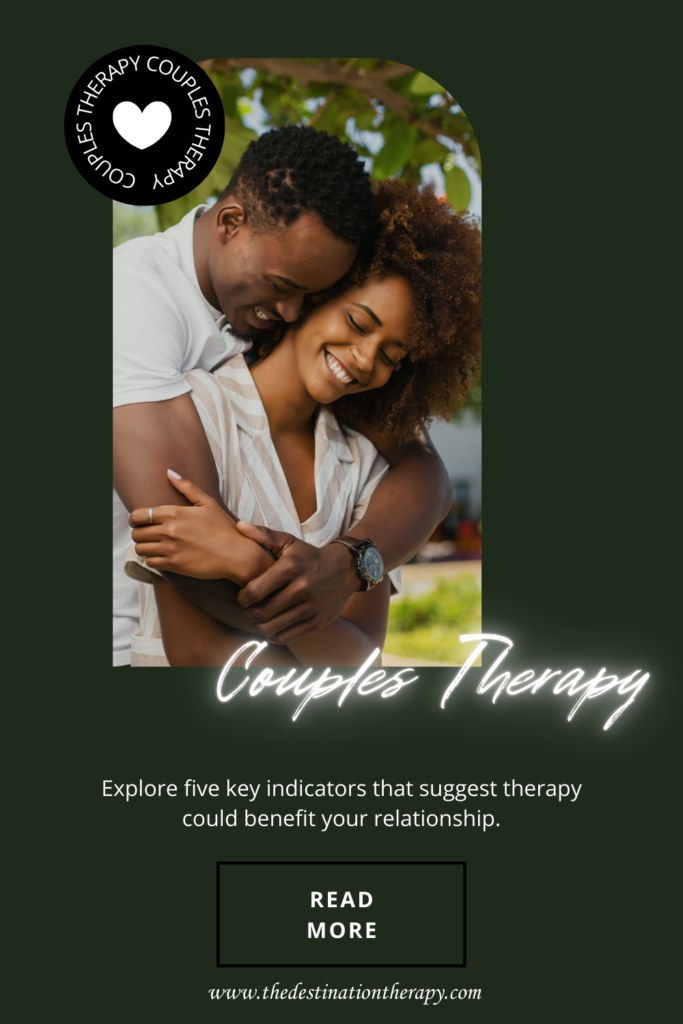If you’ve ever been in a relationship, then you know that not all stages of relationships are beautiful and smooth sailing. Sometimes, we feel disconnected, frustrated or find ourselves constantly arguing with our partner. While rough patches can be normal in a relationship, they could be an indication that it may be time to consider couples therapy.
Table of Contents
5 Key Indicators It’s Time for Couples Therapy.
I’d like to point out that many couples in all different stages can attend couples therapy. There is a big misconception that couples therapy should only be considered an option when a partnership is in crisis. This is simply not true! If you are interested in bettering your relationship with your partner in any way, then that’s enough for you to consider couples therapy. With this being said, we’ll explore and discuss five key indicators in relationships that indicate that couples therapy could really benefit your relationship.
- Firstly, communication breakdowns are a common warning sign. If you find it difficult to express your feelings, or if your partner isn’t actively listening or engaging in meaningful conversations, therapy can help you both improve your communication skills.
- Secondly, frequent conflicts that never seem to get resolved can be a red flag. Couples therapy can provide a safe space for both partners to express their needs and concerns, while learning effective conflict resolution techniques (if a solution is available, more on this later on).
- Thirdly, a lack of intimacy and emotional connection can cause strain in a relationship. A therapist can guide you in rebuilding the emotional and physical intimacy that may have been lost over time.
- Next, if there has been a breach of trust, such as infidelity or dishonesty, it can be extremely challenging to repair the damage on your own. Therapy can assist in rebuilding trust and working through the underlying issues.
- Lastly, if you or your partner are contemplating separation or divorce, couples therapy can provide tools to help navigate this difficult decision and potentially save the relationship if that is both parties’s common goal.
If any of these warning signs resonate with you, it may be time to consider seeking professional help through couples therapy. Remember, addressing issues early can lead to healthier and more fulfilling relationships in the long run.
Importance of Couples Therapy
Couples therapy serves as a vital resource for partners seeking to strengthen their relationship and address underlying issues that can lead to disconnection and dissatisfaction. It provides a structured environment where both individuals can openly express their feelings, thoughts, and concerns without fear of judgment. This arena fosters healthy dialogue, allowing couples to better understand each other’s perspectives and emotional needs. Therapy can illuminate patterns of behavior that may have gone unnoticed, enabling couples to break free from destructive cycles.
Engaging in therapy not only aids in resolving present conflicts but also equips couples with tools to navigate future challenges. Through the guidance of a trained therapist, partners can learn effective communication skills, develop empathy, enhance their problem-solving abilities and truly so much more. These skills are invaluable as they help couples to address issues as they arise rather than allowing them to fester and grow. Additionally, therapy can bring to light individual issues that may be impacting the relationship, allowing for personal growth alongside relational healing.
Ultimately, couples therapy underscores the importance of proactive measures in maintaining healthy relationships. I’ll say this as I find that individuals and couples often find themselves defeated in seeking counseling: Seeking help does not signify failure; rather, it reflects a commitment to growth and understanding. By addressing issues early on, couples can nurture a more fulfilling partnership, cultivate deeper connections, and foster an environment where both partners feel valued and heard. This proactive approach can lead to a lasting bond, reducing the likelihood of future conflicts and enhancing overall relationship satisfaction. And if you are past the proactive stage and seeking therapy – that is okay, too. What matters is that you take the steps to actively work to improve your relationship.
Common Relationship Issues
Relationships are complex and dynamic, often presenting various challenges that can test the bond between partners. One common issue is communication breakdowns, which can lead to misunderstandings and resentment. Oftentimes a couple may come in thinking that they are struggling with resolving a specific problem, when really the problem boils down to communication. When partners struggle to articulate their feelings or fail to listen actively, it creates a rift that can escalate into larger conflicts. Miscommunication can stem from various sources, including stress, differing communication styles, or unresolved past grievances. Addressing these issues through therapy can help partners learn to communicate more effectively and understand each other’s emotional landscapes.
Another prevalent challenge in relationships is the experience of frequent arguments that seem to spiral without resolution. These conflicts can arise over trivial matters, yet they often mask deeper emotional needs or unmet expectations. When couples find themselves in a cycle of fighting without resolving the underlying issues, it can lead to feelings of frustration and hopelessness. Therapy provides a safe space for couples to explore the root causes of their disagreements, facilitating the development of conflict resolution strategies that foster healthier interactions. I would be remiss if I didn’t point this out: Not all problems have a perfect resolution. This is the reality of joining lives with a whole other human being with a whole different set of needs, wants and desires. This is not meant to be discouraging, though. Couples can and do learn to move forward from a disagreement even if they don’t find the solution they are looking for. As a couples’ therapist, I invite you to practice reframing your goal of resolving your conflict to learning how to reach a place of understanding, compassion, productivity and perspective taking.
Furthermore, many couples grapple with the effects of growing apart over time. Life changes, such as career shifts, parenting responsibilities, or personal growth, can create distance between partners. As individuals evolve, they may find that their shared interests and goals have shifted, leading to feelings of isolation within the relationship. Relationships need to be pouring into, and connection can easily fall off the list of priorities when there is so much we are also responsible for.
.

Couples therapy can help partners reconnect and rediscover their bond by encouraging open dialogue about their changing needs and aspirations. Through this exploration, couples can work towards rebuilding intimacy and ensuring that both partners feel supported and understood.
Sign 1: Frequent Arguments and Conflicts
Frequent arguments and conflicts are often one of the most apparent signs that a couple may benefit from therapy. When partners find themselves in a constant state of disagreement, it can create a toxic atmosphere that fosters resentment and frustration. These conflicts might begin over small issues but often escalate into larger arguments that touch on deeper emotional wounds or unmet needs. Such a pattern not only affects the relationship’s overall health but can also lead to emotional exhaustion for both partners.
In therapy, couples can learn to identify the triggers that lead to these conflicts. Often, arguments stem from misunderstandings or differing expectations rather than the surface issue at hand. A skilled therapist can facilitate conversations that help partners articulate their feelings, allowing them to explore the underlying emotions driving the conflict. This process can lead to greater emotional awareness and a more profound understanding of each other’s perspectives, ultimately reducing the frequency and intensity of future disputes.
Through counseling, partners can learn how to approach disagreements constructively, focusing on effective communication and active listening. They can also practice negotiating solutions that satisfy both parties (keyword: satisfy enough), fostering a sense of teamwork rather than opposition. By transforming conflicts into opportunities for growth, couples can strengthen their bond while equipping themselves to handle future challenges more effectively.
Sign 2: Lack of Communication and Emotional Intimacy
A lack of communication and emotional intimacy can signify a deeper disconnect within a relationship, often leading couples to feel isolated and misunderstood. When partners struggle to express their feelings or share their thoughts, it can create a significant barrier to connection. This lack of communication may stem from fear of judgment, past experiences, or simply the busyness of life, but its impact can be profound. Emotional intimacy is essential for a thriving relationship, and without it, couples may find themselves drifting apart.
In therapy, couples can explore the reasons behind their communication breakdowns. A therapist can guide them in discovering their individual communication styles and preferences, as well as the barriers that hinder open dialogue. Once these factors are identified, partners can work on developing healthier communication habits, including active listening and expressing vulnerability. This process can help create a safe space where both individuals feel comfortable sharing their thoughts and emotions, leading to a rekindling of emotional intimacy.
Furthermore, the therapeutic process can aid in rebuilding the lost emotional connection between partners. Through guided exercises and discussions, couples can rediscover each other’s needs and desires, fostering a deeper understanding of their relationship. By prioritizing emotional intimacy and communication, partners can cultivate a stronger bond, leading to a more fulfilling and satisfying relationship. Therapy can be the catalyst for this transformation, encouraging couples to reconnect on a deeper level and enhance their overall relationship health.
Sign 3: Trust and Betrayal Issues
Trust issues are a significant red flag in any relationship, often resulting from betrayal, dishonesty, or unmet expectations. When trust is broken—whether through infidelity, secrecy, or other forms of betrayal—it can create deep emotional scars that can be challenging to heal. Couples may find themselves grappling with feelings of anger, sadness, and insecurity, leading to further conflict and disconnection. It is absolutely possible for couples to thrive and find satisfaction in their relationship after experiencing a breach of trust! But not without first addressing these trust issues and the impact they caused in the relationship.
Therapy can provide a safe and supportive environment for couples to navigate the complexities of trust and betrayal. In this setting, both partners can express their feelings and concerns openly, allowing for healing conversations that may not be possible outside of therapy. A skilled therapist can help facilitate these discussions, guiding the couple through the emotions that arise while fostering empathy and understanding. This process is essential for rebuilding trust and working towards forgiveness.
Moreover, couples therapy can assist partners in identifying the underlying issues that contributed to the breach of trust. By addressing these root causes, couples can work towards developing a more transparent and honest relationship moving forward. This may involve establishing new boundaries or communication practices that promote openness and accountability. Through this therapeutic journey, partners can learn to rebuild their relationship on a foundation of trust and mutual respect, ultimately leading to a stronger, healthier bond.
Sign 4: Growing Apart and Loss of Connection
As time passes, it is not uncommon for couples to experience a sense of growing apart. Life changes, individual pursuits, and evolving priorities can create distance between partners, leading to feelings of disconnect and loneliness. This loss of connection can manifest in various ways, such as a decline in shared activities, reduced intimacy, or a lack of meaningful conversations. When couples begin to feel more like roommates than romantic partners, it may signal a need for professional guidance.
Couples therapy can play a crucial role in helping partners navigate this growing apart. A therapist can facilitate discussions that encourage couples to explore their feelings about the relationship and identify the factors contributing to their disconnection. By openly addressing these concerns, partners can gain insight into their individual needs and desires, fostering a renewed sense of understanding and empathy for one another.
Additionally, therapy can help couples rediscover the joy and connection they once shared. Through guided exercises and activities, partners can learn to prioritize quality time together, rekindling their emotional and physical intimacy. A therapist can support a couple in re-orienting and leaning into the foundation of their relationship. This intentional focus on reconnecting can reignite the spark in the relationship, allowing couples to move forward with a renewed sense of purpose and partnership. By addressing the issues of growing apart early on, therapy can help prevent further disconnection and promote a healthier, more fulfilling relationship.
Sign 5: Unresolved Past Issues and Trauma
Unresolved past issues and trauma can significantly impact a couple’s relationship, often surfacing in unexpected ways. These experiences, whether personal or relational, can create emotional barriers that hinder connection and intimacy. Partners may find themselves reacting to each other based on past wounds rather than present realities, leading to misunderstandings and conflict. Recognizing these patterns is crucial for healing and moving forward together.
Couples therapy provides a safe environment for partners to explore their individual pasts and the effects those experiences have on their relationship. A therapist can guide couples in addressing unresolved issues in relation to the relationship, fostering open conversations that promote healing and understanding. By acknowledging and validating each other’s experiences, partners can work towards empathy and support, allowing for a deeper emotional connection.
Furthermore, therapy can equip couples with tools to address trauma and its impact on their relationship. Through various therapeutic techniques, partners can learn to manage their emotional responses and communicate their needs effectively. This process not only aids in healing past wounds but also strengthens the couple’s bond as they navigate challenges together. Ultimately, addressing unresolved issues through therapy can pave the way for a healthier, more resilient partnership built on mutual understanding and support. It is important to note that couples therapy mostly focuses on how our experiences shape the way we show up in our relationships – if you find yourself needing more time to explore, process and work through a traumatic experience, working in individual therapy in conjunction with couples therapy might be the best move for you. Some therapists may ask your permission to communicate with your individual therapist to provide continuity of care and ensure that your treatment in individual and couples therapy is cohesive! Think of it as therapists working together to make sure that you are getting your best treatment and care from your time in therapy.

Benefits of Couples Therapy
The benefits of couples therapy extend far beyond resolving immediate conflicts; they encompass personal growth, enhanced communication, and a deeper understanding of one another. One of the most significant advantages is the development of healthy communication skills. Couples learn to articulate their feelings, actively listen to each other, and engage in constructive dialogue. These skills not only improve the quality of discussions but also foster a sense of safety and trust within the relationship.
Additionally, therapy can facilitate personal growth for both partners. As individuals explore their emotional landscapes and past experiences, they gain valuable insights into their behaviors and reactions. This self-awareness can lead to personal transformation, allowing each partner to contribute positively to the relationship. Furthermore, as partners grow individually, they can bring renewed energy and perspective to their shared life, enriching the partnership.
Another critical benefit of couples therapy is the opportunity to rebuild and strengthen emotional intimacy. Through guided exercises and discussions, partners can reconnect on a deeper level, fostering a sense of closeness and understanding. This enhanced intimacy can lead to increased satisfaction in the relationship, as both partners feel more valued and supported.
Couples may go to therapy together unsure of their future together – that is okay, too. If you and your partner’s mutual goal is to work on their relationship in the hopes of resolving your challenges, great. If your mutual goal is to find a way to separate amicably, that’s okay too. The point I want to make here is that couples therapy is going to look different for every couple. This space is for you and your goals, even if they don’t seem like the “typical” goals of couple therapy.
Finding the Right Couples Therapist
Finding the right couples therapist is an essential step in the journey toward healing and growth. A therapist’s expertise, approach, and personality can significantly impact the effectiveness of the therapeutic process. When searching for a therapist, it’s crucial to consider their qualifications and experience, particularly in working with couples. Look for a licensed professional who specializes in relationship issues and has a strong understanding of the dynamics at play in partnerships.
Another important factor to consider is the therapist’s approach to therapy. Different therapists may employ various techniques. It’s essential to find a therapist whose approach resonates with both partners and aligns with their goals for therapy. Many therapists offer initial consultations, which can provide an opportunity to gauge compatibility and discuss expectations. My suggestion for you is to set up some consultations and ask your potential therapist how they would typically approach your concerns in sessions. Your consultation is the time for you to feel out your therapist and get a small glimpse into what working together would look like!
Lastly, the relationship between the therapist and the couple is vital for successful therapy. Both partners should feel comfortable and safe with their therapist, as this rapport is crucial for open and honest communication. It’s perfectly acceptable to seek out multiple therapists before finding the right fit. Taking the time to find a therapist who meets both partners’ needs can significantly enhance the therapeutic experience and increase the likelihood of achieving meaningful growth and change.
We are here to help
Recognizing the warning signs that indicate a need for couples therapy is the first step toward healing and strengthening a relationship. From frequent conflicts and communication breakdowns to trust issues and emotional disconnection, these indicators serve as vital cues that professional support may be necessary. Couples therapy offers a structured and supportive environment where partners can address their concerns, develop healthier communication skills, and rebuild emotional intimacy.
The benefits of therapy extend beyond immediate resolutions; they encompass personal growth, enhanced understanding, and a renewed sense of partnership. By seeking help early on, couples can prevent further deterioration of their relationship and foster a more fulfilling, resilient bond. Ultimately, taking the step to engage in couples therapy reflects a commitment to growth, understanding, and a desire to nurture the relationship.
If you resonate with any of the warning signs discussed in this article, consider contacting us at Destination Therapy to get set up with a free consultation with one of our couples’s therapists! The journey may be challenging, but the rewards of improved communication, deeper emotional connection, and a stronger relationship can be life-changing. Remember, there is nothing wrong with seeking extra support in your relationship. Seeking help is a sign of strength, and addressing issues proactively can lead to a healthier, more satisfying partnership in the long run.


